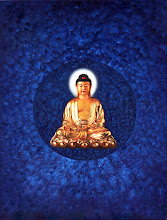By Mehru Jaffer Vienna
Sikhs are still struggling to cope with the bloody violence inside a place of worship in Austria
Dr Avtar Singh Seth, 73, first heard about the Ravidasis only a few weeks ago. On May 25, the retired medical doctor was woken up by a telephone call from an old friend in Australia. "My friend wanted to know if I was safe? He had heard that a Sikh was shot dead in Vienna... that many Sikhs were wounded. I got out of bed and found out what had happened. I was worried if this was an incident of hate crime by Austrians against Indians," he said about the May 24 murder and mayhem at a Vienna place of worship of the Dera Sach Khand sect who are devotees of Ravidas, a 14th century 'progressive' Indian saint and reformer.
According to Som Dev, 45, head of Vienna's Ravidasi Gurughar, there are 250 Ravidasis in the city. He works as a taxi driver. He came to Vienna 17 years ago from a village in Punjab's Jalandhar district. "At first I attended sermons at the Sikh Gurdwara. In 2005, the Ravidas Gurughar was opened and we pray here now. I still attend special ceremonies at the Sikh Gurdwaras. I have nothing against my Sikh brothers but I am a Ravidasi and not a Sikh," said Som Dev.
The Sunday sermon at the Ravidasi Gurughar on May 24 was special because Guru Niranjan Das , 67, head of the Dera Sach Khand sect, was visiting from India together with Ramanand Das, 56, the second in command. The sermon by Ramanand was interrupted when someone from the audience fired a gun and knives began to fly around the room.
In the mayhem, both Niranjan and Ramanand were wounded including other members of the congregation. An eyewitness confessed that the prayer meeting attended by women and children was converted within minutes into a battlefield and blood was sprayed everywhere. The police arrested six suspected attackers immediately.
While Ramanand succumbed to his wounds the same evening, Niranjan Das recuperated at a Vienna hospital after a serious operation for a week before he returned on June 3 to India together with the remains of Ramanand in a private plane sent here by the Punjab government.
"This is the first time that I heard of the Ravidasi sect," said Dr Seth at his picturesque home in the hills about 65 km from Vienna on the Austrian Hungarian border. Dr Seth is perhaps the first Sikh who came to Vienna in 1955 to study medicine here.
There were about seven students in all of Vienna at that time and Diwali was celebrated at a local hotel. Ceremonies were performed, when necessary, at home. Vienna was the cheapest place to study. It cost Rs 450 per month in England, Rs 350 in Germany and only Rs 250 in Vienna, a city that was ruined by the last world war. There was no bathroom where Dr. Seth stayed as a student and for years he used the public baths.
Almost two decades later, the population of people of Indian origin swelled when some 3,500 Indians expelled from Uganda found asylum in Austria. Some Sikhs were part of this large group of newly arrived Indians.
In 1975, there was talk of building the first Gurdwara here. Dr Seth had graduated to an official general practitioner in an Austrian province. He was chosen the first president of the Sri Guru Nanak Satsang Sabha. "I resigned after a year. I no longer felt inspired," said Dr Seth who hangs a huge photograph of the Harmandar Sahib (Golden Temple) in his home which he shares with Sylvia, his Austrian wife. Their two sons live and work in Switzerland.
Dr Seth does not visit the Gurdwara in Vienna. He is not religious but very traditional. He points out that idol worship is forbidden to Sikhs. He finds it strange that some Sikhs hang pictures of Bhindranwale beside those of revered Sikh Gurus today.
Dalits are the followers of Ravidas here as well as in India. The conflict originates from the fact that mostly landless Dalit Sikhs in India are still intensely exploited and humiliated by the 'landed and Jat Sikhs' with daily discrimination, low wages, bonded labour and even a ban on their entry inside Gurdwaras. Dalits are now collectively resisting this and asserting their rights, and following new cults is integral to this assertion.
Dr Seth wonders if the rising affluence of the Dalits in Austria is responsible for the rivalry between Sikhs and the Ravidasis here. "It is all about money. Donations collected during a sermon by well known gurus often add up to many euros. This may cause envy and bad blood," speculates Dr Seth who nurses precious memories of his childhood in Amritsar.
After the bloodbath during the partition of Punjab in 1947 had subsided, he remembers visiting the Golden Temple - and not only to pray. "Around the temple there was a attractive community life. I went there almost every day to listen to stories told by wise men. We met our friends and played there. There was mouth watering food offered to us for free and I was happy to break bricks to help to broaden the pavement on the northern flank of the temple," reminisces Dr Seth who feels that today he is unable to practice being a better Sikh among Austrians. "Many Sikhs are hot headed and lack religious education," he regrets.
Source: Hard News
Sunday, August 2, 2009
Subscribe to:
Post Comments (Atom)

No comments:
Post a Comment